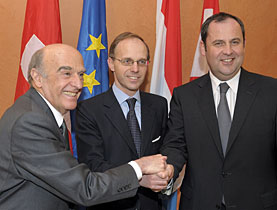Swiss receive confidence boost in London

Swiss Finance Minister Hans-Rudolf Merz has expressed confidence that Switzerland will not be added to the OECD's tax haven blacklist.
Merz, currently head of state under Switzerland’s revolving presidency, was boosted by the support of British Prime Minister Gordon Brown after meeting him in London on Saturday.
“I put the question of this famous blacklist to Gordon Brown, and he told me that he shared my concern and that everything had to be done to avoid such a situation,” Merz said after the meeting.
The two leaders spoke on the sidelines of an informal meeting of the International Monetary and Finance Committee (IMFC) in London. Brown said that his government would support Switzerland’s stance.
The world’s major industrialised nations, known as the Group of 20, or G20, are to examine a proposal to blacklist Switzerland and other countries at a meeting in London at the beginning of April.
Cooperation
The G20 is reacting to an anti-tax haven initiative led by the Organisation for Economic Co-operation and Development but the proposal has been somewhat overtaken by rapidly developing events this week (see context).
Merz announced on Friday the government’s decision to cooperate on cases of international tax evasion, effectively watering down Swiss banking secrecy.
Switzerland is not a member of the G20 but it sent a delegation to London – led by Merz – to attend the IMFC meeting.
The discussion between Merz and Brown centred on international cooperation in tax matters as well as on current efforts to stabilise international financial markets, a statement from the Swiss finance ministry said.
Merz confirmed that Switzerland was willing to enter into negotiations to revise double-taxation treaties on the basis of the OECD standard on administrative assistance in tax matters.
He also made the case that Switzerland should be allowed to take part in G20 activities in relation to this and other matters. “I offered our services in the working groups, because that is where the decisions are prepared.”
Brown promised that his government would support direct Swiss involvement in G20 activities at least on a technical level, the Swiss finance ministry said.
Complaint
The Swiss finance minister complained to Brown that Switzerland had been included on a provisional OECD blacklist without prior notification.
The move came on March 5, although Merz did not learn of it until a week later. He said this was unacceptable, both politically and according to international law.
Swiss Economics Minister Doris Leuthard and Swiss Foreign Minister Micheline Calmy-Rey made the same complaint in interviews over the weekend.
Calmy-Rey explained in an interview in the NZZ am Sonntag newspaper that the decision to relax Switzerland’s banking secrecy would work in the country’s favour.
“Now Switzerland is no longer on the defensive on the question of tax and no longer needs to hide,” she argued. Switzerland can now confidently call for other finance centres to comply with international standards, she added.
Timing
Speaking at a London media conference, Merz defended Switzerland’s last minute turn-around on banking secrecy, denying that the move came too late.
“If we had been the first to act, we would have been told that all the clients would flee Switzerland and move to places such as Singapore and Hong Kong. But as all these centres announced their decision in the same week, it cannot be said that it was a weakening of our country.”
Merz also intended to organise a meeting with the United States Treaasury Secretary Timothy Geithner in Britain to broach the thorny subject of the UBS scandal, but Geithner was not available.
Instead, Merz spoke to his counterpart by telephone on Friday and judged the discussion positive for the negotiations to come.
swissinfo with agencies and Catherine Ilic in London
Switzerland, Austria and Luxembourg offered to relax strict bank secrecy in some tax evasion cases on Friday in response to a global crackdown on tax havens led by the OECD.
The three countries made the concessions ahead of a meeting of finance ministers from the G20 group due to discuss tax havens.
Andorra and Liechtenstein made similar moves on Thursday, while Monaco followed on Saturday.
All were among the names handed to G20 this week by the Organisation for Economic Cooperation and Development, which maintains a blacklist of uncooperative tax havens.
Switzerland, Austria and Luxembourg said on Friday they would abide by OECD rules by cooperating on sharing information about foreign savers with other countries on a case-by-case basis, but not automatically, as many countries want.
Critically, Switzerland will now cooperate in cases of suspected tax evasion, once double taxation agreements are renegotiated with other countries, which could take time.
Previously, the world’s biggest offshore centre would only cooperate with foreign authorities when they could prove outright tax fraud.

In compliance with the JTI standards
More: SWI swissinfo.ch certified by the Journalism Trust Initiative











You can find an overview of ongoing debates with our journalists here . Please join us!
If you want to start a conversation about a topic raised in this article or want to report factual errors, email us at english@swissinfo.ch.